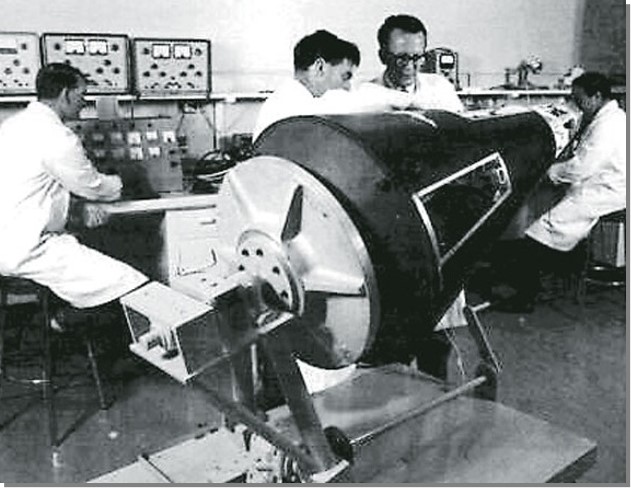
by Gideon Marcus
Constants
The universe is based on a host of magic numbers. Without them, the cosmos would be entirely different and probably uninhabitable. Some of these "constants" are familiar to the layman, Pi perhaps being the most so. Engineers are familiar with electron-Volts and atomic masses. Chemists know Avogadro's number, the relationship between atomic mass and metric mass. Mathematicians know e.
e is a truly fascinating number. Roughly equal to 2.71828, it is the fundament of exponential growth. For example, if you have a $1 compounded annually at 100% interest, at the end of a year you'll have $2. If you have $1 compounded monthly at 100% interest, at the end of the year you'll have $2.62. If you have $1 compounded continuously (i.e. over an infinite number of instants), you will have $2.71828 at the end of the year.
In calculus, if you integrate the function e to the x power, you get… e to the x power! Conversely, of course, the derivative of e to the x is e to the x. That means that e to the x is the one function whose rate of change is the same as its position is the same as its acceleration.
What does this have to do with Analog Science Fiction, particularly this latest issue?

by Kelly Freas
Well, when you have the same editor for 30 years, and he hires the same writers every issue, and he has a rigid editorial policy that eschews innovation and prioritizes certain pseudo-scientific fetishes, you end up with a certain kind of consistency. Not necessarily a desirable consistency, but consistency nevertheless. Read on, and you'll see what I mean.
e gad
The Royal Road, by Christopher Anvil

by Kelly Freas
You know you're in trouble when Chris Anvil gets the cover. Actually, this continuan of the saga of Captain Roberts and his crew of two isn't so bad. Previous installments had the trio serendipitously developing a mind-control ray and using it to wrest a planet from a despotic computer. Then the three posed as nobility to sway said planet further. It was all very glib and distasteful, and I didn't like it.
This story spends two thirds of its length rehashing the events of those stories for new readers and then bringing the trio back, making it a quartet (with Bergen from a story in the December 1967 issue), and unleashing them on a new problem. A somewhat primitive planet is fractured into more than a dozen petty kingdoms, and the Interstellar Patrol needs a majority of them to agree in order to establish a base. In the last third of Royal Road, we get the solution to this conundrum. It mostly involves creating an economic catastrophe that only kingdoms favorable to the Imperial Patrol are equipped to address, thus putting these kingdoms on top. Anvil does note that the gambit could have killed millions, so at least things aren't quite so glib as before.
At least now the quartet of Captain Roberts has been transformed into a sort of Retief series. Anything's an improvement. Anyway, I didn't hate it. A low three stars, I guess.
No Shoulder to Cry On, by Hank Davis

by Leo Summers
After the vastly superior alien federation shows up on Earth, a sociologist is brought back to see what he assumes will be their advanced technology. Instead, it turns out that humans have been quite a bit more successful than the ee-tees, at least in one vital field.
A Twilight Zone episode writ small, but inoffensive. Three stars.
Duplex, by Howard L. Myers

by Kelly Freas
Kent is a person with a literal split personality. His left half is under the control of a silent partner, dubbed "Pard", while Kent, nominally the "dominant" personality, runs the right half. Together, they lead a pleasant life as an extremely successful concert pianist. That is until Pard gets them both tangled up in a spy conspiracy that threatens not just the world…but themselves!
I liked the story's handling of mental handicaps, and it's a pleasant piece overall. Three stars, but the highest three stars in the issue.
It's RIGHT Over Your Nose!, by Ben Bova

by Kelly Freas
In this science-ish article, Bova suggests that quasars, highly red-shifted quasi-stellar radio sources, may in fact be Bussard ramjets run by aliens. Thus, rather than being natural phenomena of tremendous power far outside the galaxy, they are artificial phenomena of middlin' power within.
I tend to prefer natural over artificial solutions to problems. Plus, why is every star-drive in the galaxy going away from us?
Still, it's readable, if breathless. Three stars.
The Mind Reader, by Rob Chilson

by Leo Summers
Robot mini-planes prove to be decisive in the next Southeast Asian war. This story is told mostly in dialogue between two people in a sort of "As you know, Bob…" fashion.
The concept is interesting and unique. The story is not compellingly told. Two stars.
Satan's World (Part 2 of 4), by Poul Anderson

by Kelly Freas
Finally, we have the next installment in Satan's World, which started last month. The crew of Muddlin' Through was split up when David Falkayn was abducted by Serendpity Inc., a galactic information clearing house. This provoked Polesotechnic League magnate Nicholas Van Rijn to take a personal hand in things, sending Adzel the saurian centaur to retrieve the poor lad.
Turns out Falkayn (predictably) had been brainwashed. It also turns out that Serendipity is working with, perhaps in the thrall of, a race of mysterious aliens known as the Elders. The ulterior motive of this ostensibly neutral organization suggests some new power may be planning some kind of galactic conquest.
Meanwhile, Chee Lan the foul-mouthed Cynthian and Falkayn head to the world Serendipity told him about in part one–the frozen world in a cometary orbit that is closing in on its star, Beta Crucis. This will cause its cryosphere to melt, revealing a mother-lode of precious metals. But Van Rijn's team isn't the only one interested in the world, aptly dubbed "Satan". Twenty UFOs have just dropped out of hyperspace in the vicinity, and they don't look friendly…
Anderson has a lot of tics I don't like, particularly his drawing of characters as…well, assemblages of tics. Adzel is a placid Buddhist, Falkayn is a cipher, Chee Lan is a salty Little Old Lady from Pasadena, and Van Rijn is a lustier, more Dutch version of Raymond Burr's Ironside.
The author also devotes lots of ink to the physical descriptions of his astronomical creations, which I'm sure are fascinating to some, but perhaps are most gratifying for the three cents a word they earn him.
That said, just as I start to get bored, I find myself turning the page and reading on. So, another three star segment.
Less than Three

So, just like the constant "e", Analog clocks in at just under three. Indeed, that's how I feel about the magazine as a whole lately. Sure, there are better issues than others, and sure, there are some standout pieces, but for the most part, I find myself doing anything–cleaning the bathroom ceilings, cataloging my 45s, sorting stamps–rather than read Analog. Not that I hate the experience when I get to it. It simply doesn't give the thrill of anticipation that Galaxy still gives me after all of these years. Even F&SF, which hasn't been terrific since 1962, retains residual goodwill.
Of course, this month's Analog clocks in at 2.9 (rounding up 2.85), which is better than Fantasy and Science Fiction (2.6). But it's worse than Galaxy (3.1) and IF (3.3).
It was a really thin month for magazines, and out of the four that were published, the better-than-three-star stories would barely fill one of them. At least women wrote 11% of new fiction pieces, which is on the higher end lately.
Well, here's hoping that next month's Analog picks a different constant to ape, if it can. And let's hope it's not Planck's Constant!

![[May 31, 1968] Euler's Issue (June 1968 <i>Analog</i>)](https://i0.wp.com/galacticjourney.org/wordpress/wp-content/uploads/2023/05/680531cover.jpg?resize=672%2C372)

![[February 26, 1968] Stormy Weather (March 1968 <i>Analog</i>)](https://i0.wp.com/galacticjourney.org/wordpress/wp-content/uploads/2023/02/680226cover.jpg?resize=672%2C372)













![[November 30, 1967] One door closes… (December 1967 <i>Analog</i> and Australia joins the Space Race!)](https://i0.wp.com/galacticjourney.org/wordpress/wp-content/uploads/2022/11/671130cover.jpg?resize=672%2C372)












![[August 31, 1967] I wouldn't send a knight out on a dog like this… (September 1967 <i>Analog</i>)](https://i0.wp.com/galacticjourney.org/wordpress/wp-content/uploads/2022/08/670831cover.jpg?resize=672%2C372)










![[June 30, 1967] Bad trip (July 1967 <i>Analog</i>)](https://i0.wp.com/galacticjourney.org/wordpress/wp-content/uploads/2022/06/670630cover.jpg?resize=672%2C372)













![[May 31, 1967] Phoning it in (June 1967 <i>Analog</i>)](https://i0.wp.com/galacticjourney.org/wordpress/wp-content/uploads/2022/05/670531cover.jpg?resize=672%2C372)




















![[October 31, 1966] Respite from the horror (November 1966 <i>Analog Science Fiction</i>)](https://i0.wp.com/galacticjourney.org/wordpress/wp-content/uploads/2021/10/661031cover.jpg?resize=355%2C372)










![[September 30, 1966] Return to Base (October 1966 <i>Analog</i>)](https://i0.wp.com/galacticjourney.org/wordpress/wp-content/uploads/2021/09/660930cover.jpg?resize=672%2C372)









![[May 31, 1966] Worth Remembering (June 1966 <i>Analog</i>)](https://i0.wp.com/galacticjourney.org/wordpress/wp-content/uploads/2021/05/660531cover.jpg?resize=672%2C372)










![[December 31, 1965] Untermag (January 1966 <i>Analog</i>](https://i0.wp.com/galacticjourney.org/wordpress/wp-content/uploads/2020/12/651231cover.jpg?resize=600%2C372)







